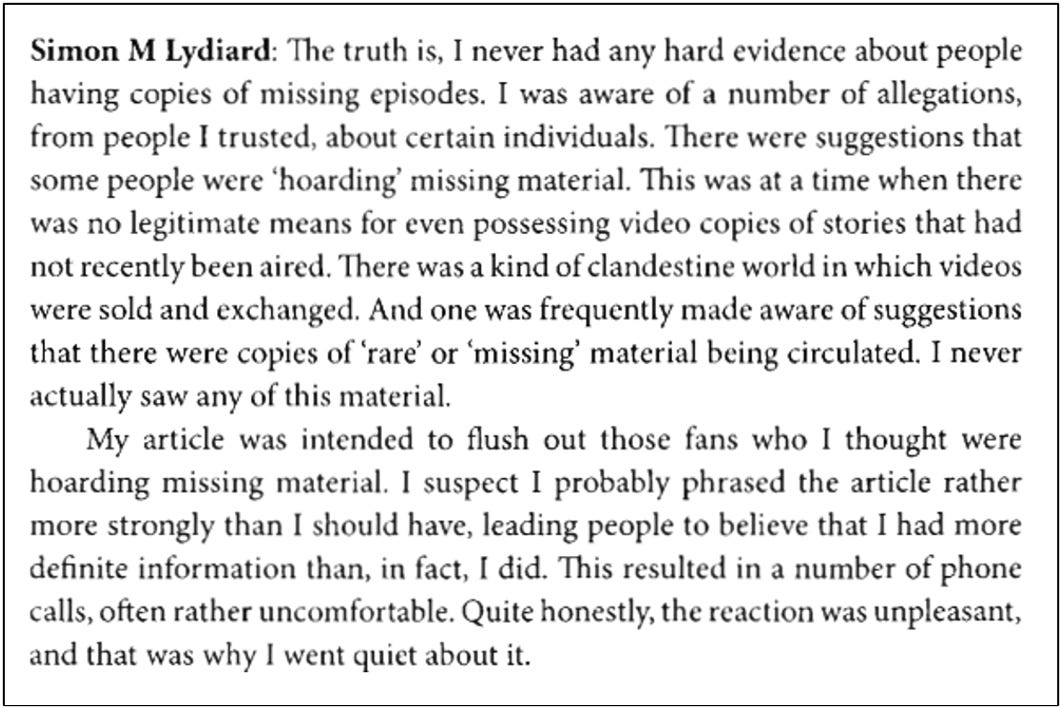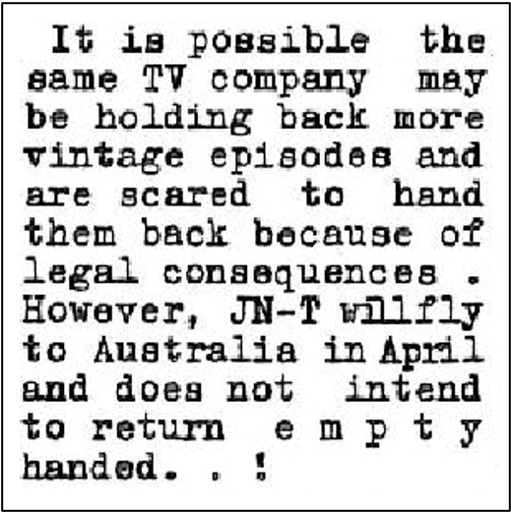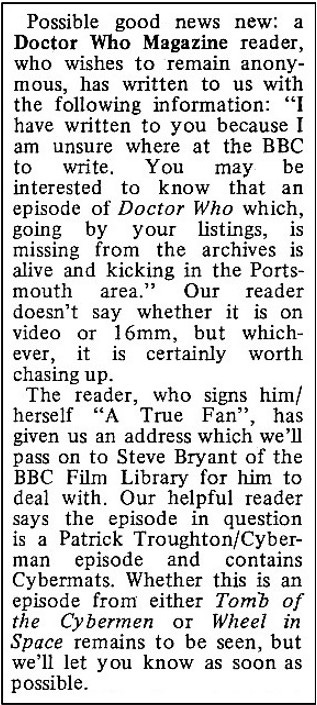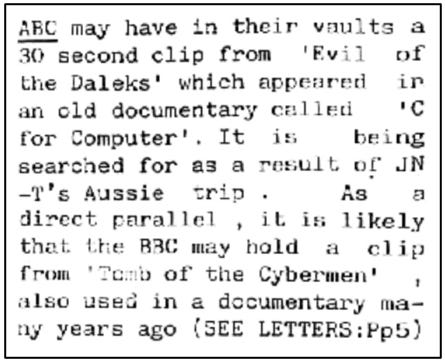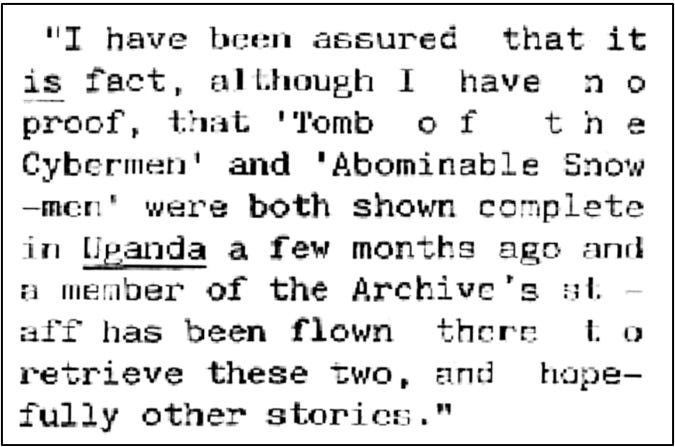Fandom has long been interested in the missing episodes of Doctor Who. Rumours about the possible existence or whereabouts of the episodes are popular on internet forums and social media. Many – indeed, practically all – of these rumours are nonsense but it doesn’t stop them being repeated and picked over time and again. But it was always thus, even before the internet.
Prior to fandom moving wholesale onto the internet – a move that started in the mid-1990s and which, for the sake of a simple milestone, we’ll say was essentially complete around 2000 – missing episodes rumours spread by word of mouth at fan gatherings and in fanzines. Many modern fans will never have seen, maybe never even have heard of, fanzines. In brief, fanzines were amateur magazines made by fans for other fans. They were typically crudely produced on erratic schedules, with circulations which ranged from a few dozen to several thousand. Some were associated with fan clubs; others were the work on one fan in their bedroom.
The content of fanzines varied as much as does the fan creativity we see on the internet now. Fanzines included all the passion we see on forums and sometimes the same lack of responsibility in their reporting of rumours about the programme. It is fascinating to look back over the roughly two decades in which fanzines were the primary means of fan discourse and survey how they propagated missing episodes rumours and see in what ways this was similar to, or different from, what we see on the internet today. It’s also possible with the benefit of the research that has been undertaken in the intervening years to debunk some of these rumours or to identify their origins. The 1980s was the highpoint of fanzine production and distribution so that’s the period I’m covering here.
Before we proceed, I should make clear that except where explicitly stated otherwise, none of the rumours referenced below were genuine leads as to the whereabouts of missing episodes and there’s no reason to think they were ever credible.
Also, with a few exceptions where context makes it unreasonable to do so, I’m omitting the names of the fanzine writers, editors and correspondents involved to avoid causing any embarrassment all these years later, particularly as most were well-intentioned even if the rumours they spread were inaccurate and unhelpful.
Fanzines boomed in the early 1980s, propelled by advances in production methods and the excitement surrounding the twentieth anniversary of the series. It was around 1983 that fanzines really became a force in fandom. Consequently, we start our chronicle in Feb/March 1983 with volume 3, issue 3 of Skaro, one of the leading fanzines of the period. In his editorial, the editor Simon Lydiard claimed there were rumours that (then-missing) The Tomb of the Cybermen still existed. This was in reference to his incendiary opinion article elsewhere in the issue, which began:
He alleged that this collector’s episodes were copied or stolen from the BBC archive. We’ll be hearing a lot more about private collectors and The Tenth Planet here on in, although most, if not all of it, is without foundation. The only accuracy in the issue is regards The Tomb of the Cybermen, which did still exist, but not with a private collector – it would be recovered from a Hong Kong’s Asia Television nine years later.
Lydiard’s article was like kicking a hornets’ nest and the subject was picked up in reader letters in the following two issues of Skaro. An anonymous letter in volume 3, issue 4 (April/May 1983) included the following wild claims:
A more level-headed correspondent wrote in response to Lydiard’s article: “How much is fact, and how much rumour? … Why has it only come to light now? Of course I would love it to be true, but these things could just as easily prove a terrible let down.”
A further flurry of letters on the subject were duly printed in volume 4, issue 5 (June/July 1983), with disgust being shown to the alleged hoarder of episodes. In a brief editorial response, Lydiard reported:
The bible on missing episodes is Richard Molesworth’s impressive tome Wiped!. For this book, Lydiard spoke to Molesworth about the origin of the rumours he reported in Skaro:
Molesworth suggests the origin of rumours such as these was the existence of a videotape containing short extracts from many missing episodes which was clandestinely circulated within parts of fandom. The clips originated in Australia and had been filmed from a home TV screen using an 8mm cine camera. This reel of clips did not, as some had assumed, denote that fans were sitting on a trove of complete episodes. The original film from which these tapes derived was later rediscovered and loaned to the BBC to copy in 1998.
At this point we need to introduce the brash new fanzine Doctor Who Bulletin (later DreamWatch Bulletin), or DWB as it was universally known. DWB had a tabloid ‘publish and be damned’ ethos and was happy to promote speculation and rumour alongside hard news from the worlds of Doctor Who. In later years the fanzine adopted a slightly more sceptical approach, conceding that: “In its earlier days DWB was inclined to print news of any rumours as fact” (issue 91, July 1991). The sensational content of its early issues, which included various missing episodes rumours, helped DWB become a major player in the fanzine scene from the mid-1980s to the early 1990s.
DWB’s second issue (September 1983) included an article about missing episodes which quoted Lydiard’s Skaro report and confirmed it to be “true”. DWB later claimed in issue 5 (December 1983) that both it and Skaro had been suppressed by the BBC for their coverage of missing episodes in private hands. This seems fanciful, but a representative of BBC Enterprises interviewed in issue 7 (February 1984, more from which in a moment) conceded it was ‘possible’ that this was why Doctor Who producer John Nathan-Turner (henceforth JNT) had ‘banned’ the fanzine.
This coverage of missing episodes resulted in a number of unlikely reports in the DWB letters pages. In issue 7 a fan from Staffordshire claimed to “know for a fact” (a common phrase in rumour-land) that episode four of The Tenth Planet, episode one of The Abominable Snowmen, and episodes of The Power of the Daleks existed in private hands, and that these were just “the tip of the iceberg”. In common with a great many purveyors of missing episodes myths, this correspondent referred to ‘tapes’, whereas any 1960s missing episodes held privately would almost certainly have been on film. The confusion of film and videotape as media for missing episodes is one simple red flag that a rumour-monger doesn’t understand, and almost certainly doesn’t have any genuine leads about, the subject of missing episodes.
In the same issue, a fan from Kent claimed to have received a letter from a fan in Zimbabwe explaining that they had returned episode four of The Invasion to the BBC that September but:
The correspondent had promised his contact “complete anonymity”, so nobody could follow up on this unlikely claim. This report is clearly nonsense but it’s also worth noting that Zimbabwe (previously Rhodesia) only bought the first 53 episodes of the series (plus some Tom Baker episodes later) so never had any Troughton episodes to return. A more sensible remark in the letters page came from a fan in Manchester, who lauded those film collectors who had saved prints from the “BBC rubbish bin”. From a modern perspective, we know of film collectors who have indeed safeguarded material the BBC discarded (usually without knowing its value) and who deserve our thanks.
Issue 8 of DWB (March 1984) reported accurately the recent return of the final episode of The Celestial Toymaker from broadcaster ABC in Australia. However, its report went on to make the following illogical and unfounded suggestion:
The next issue of DWB (April 1984) claimed:
Hope appeared to be the sole basis of the story. They also again reported that JNT was flying to Australia “in the hope of retrieving lost episodes”. In fact, his visit was for promotional purposes but Wiped! reveals that he did take the opportunity to call on the ABC to check whether they held further episodes, but they did not. The BBC archive also made its own enquiries with negative results.
Although not a fanzine it’s worth recording the intervention of the official Doctor Who Magazine in one missing episode recovery. Issue 87 (cover-dated April 1984, meaning a March publication date) included the following:
The episode in question turned out to be The Wheel in Space episode three. The anonymous letter was in fact written by one of the magazine’s own regular writers. The report went on allege that the print’s owner didn’t want to return it to the BBC. This was unfair. As revealed in Wiped!, the owner was a fan and had already been in contact with Steve Bryant to arrange the print’s return but a bout of illness had delayed this. It was returned in April 1984.
DWB’s tenth issue (undated but circa May 1984) included a further letter from the fan in Kent who had claimed that The Invasion episode four had been sent back to the BBC from Zimbabwe. This time he reported:
In the same issue the editor reported that “A reliable source” (another popular term) was claiming the whole of The Evil of the Daleks had been recovered in Australia, which they speculated may relate to JNT’s visit there. Sticking with the same country and story, the scope of this rumour was much diminished (if indeed it was the same rumour and not coincidental) by the time of issue 12/13 (July-August 1984), which reported:
Forget the reference to The Tomb of the Cybermen; this was a report that a clip had been used in the BBC’s Talkback programme in 1967, which was true but that edition was also missing. The ‘C for Computer’ rumour, however, was closer to the money. This, it later transpired, was an episode in the Perspectives series. It too was missing as a whole but film inserts for it, including several clips featuring Daleks, did survive in the ABC archive. These were recovered by the BBC in 1995. The clips were actually from The Power of the Daleks, rather than Evil as DWB had reported.
DWB struck lucky (sort of) in issue 14 (September 1984) with a cover story about missing episodes in Africa, inspired by a radio interview in which someone reported having seen Patrick Troughton episodes on Nigerian television. This would bear fruit, but not quite in the form anticipated. Meanwhile, the same report also included this comment from a reader’s anonymous letter:
Although Uganda buy a number of now-missing episodes to show in the 1960s, the two stories named are not believed to be amongst them.
DWB was able to report in issue 15 (October 1984) that the so-called “Afro-Tapes” did exist, but they weren’t Troughton stories as had been expected. In fact, the missing instalments of both The Time Meddler and The War Machines (three each) had been located in Nigeria and were (slowly) on their way back to the BBC. The editor went as far as to suggest: “It now seems a matter of time till most, (if not all), [sic] black and white episodes are safely back in the BBC Archives.” A late addition to the same issue reported more potential finds:
We’ll pause our survey there and cover the rest of the decade next time. Subscribe to receive the next instalment direct to you remail (it’s free and makes me feel better about the time I spend on this!).
Images © the original writers or editors of the fanzines and are reproduced under the fair dealing provisions of copyright law.
Thanks to all the kind souls who shared their fanzines and scans with me and to Tim Burrows.
Sources
The fanzines cited, of course. But the main sources regards missing episodes are:
Richard Molesworth, Wiped! Doctor Who’s Missing Episodes, 2nd edition (2013), available here.
BroaDWcast website, edited by Jon Preddle and John Lavalie.
The Missing Episodes Podcast by Tim Burrows, available from podcast platforms such as podbean.







